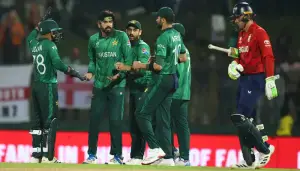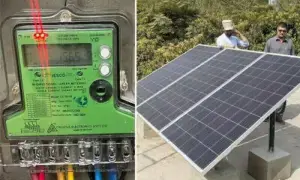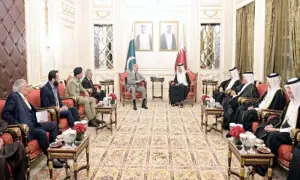Fixed tax regime withdrawn on electricity bills for one year on traders’ community demand
4 min readISLAMABAD: The federal government has decided to withdraw a fixed tax regime on electricity bills for one year, Miftah Ismail, the federal finance minister, announced on Thursday after three days of talks with the traders’ community that has been in protest against the levy since July 1.
“The decision was taken as per the demands of all traders’ community, Prime Minister Shehbaz Sharif and PML-N leaders’ instructions,” he said after meeting with them in Islamabad. He was accompanied by Power Minister Khurram Dastgir.
Receiving tax from traders via their electricity bill was one of the clauses approved by the National Assembly in the Finance Bill 2022 on July 29, prompting the community to protest over the tweaks.
PM Shehbaz and PML-N leader Maryam Nawaz had asked the finance czar to take back the decision and ensure that small traders were “completely satisfied” with the new tax law.
Miftah while addressing a press conference on July 31 had hinted that the government would try to waive off tax on shops using 100 to 150 units of electricity. Such owners to pay Rs36,000 of annual tax (including sales and income) in the electricity bill and get registered on the active taxpayer list, he added.
“And, the prevailing system, which was there for over a month, will continue for next three months,” Dastgir said, adding that after it the government would again sit with the traders’ community for improvement in it.
“But, I will reiterate that we have ended the fixed tax that was added in this month’s commercial bills has been ended after working on the directives of PM Shehbaz.
Dastgir, while addressing a query on the payment of bills, said that finance and petroleum ministries would issue directives to banks and distribution companies for all the consumers of commercial connections.
‘Sigh of relief’
The community has taken a sigh of relief after the finance and power ministers’ announcement, Ajmal Baloch, the All Pakistan Traders Association president, said in a video statement.
“They have realised after three days of our talks,” he said, adding that the July 1 decision had disturbed so many people. He was of the view that many people were still disturbed by such a decision.
Baloch advised the government to consult the stakeholders before taking such a decision and prior talks would have not created such a situation where traders across the country were protesting against the levy.
The government announced the decision to abolish the tax at 8pm on Thursday after talks.
“I request finance and power ministers to issue directives to all banks to [allow traders community] pay the bill without the sales tax or else people would be standing in queues outside WAPDA offices because the due date is near. An order should be issued in the morning [Friday] so that traders can pay the bill.”
Earlier, the community had slammed the government for introducing such a levy and demanded of Miftah to step down as it was not “possible for the finance minister to handle the job”.
Baloch had described the tax as “black law”, adding that the community was already paying the tax on bills. They had warned of protest outside the FBR if the decision was not withdrawn and shutter down strike.
“Income tax can be fixed on the retailer, however, sales tax not,” he had said and rejected the government assistance for shop owners using 150 units of electricity. “Such owners are exempted from the tax.”
Govt should have some formula: Kashif
Kashif Chaudhry, a traders’ association leader, said that the government should lower their expenses and introduce a “formula” rather than impose new taxes on the community members, who are already “paying 10% income tax, 17% general sales tax, advance tax, extra tax, fuel price adjustment tax, and levy for the Neelum Jhelum power plant.”
He explained that such a levy was not applicable to Tier-I (people who have a shop on an area of 1,000 square feet area and have Rs1,200,000 million annual salary) and Tier-II (below the first section) under the law. Kashif said that sales tax was not applicable to retailers, it applied to importers and manufacturers.
“A person whose salary is Rs100 and a person whose salary is Rs30,000, both are paying Rs6,000,” the leader said while lamenting the tax amount.
The government had suggested waiving off shop owners using 150 to 250 units of electricity and introducing slabs. But the community rejected all of them. He lamented the amount of Rs70 per unit FPA.
“We are already paying for the line losses,” he said, “we are ready to pay tax but this one was irrelevant.”
For the latest news, follow us on Twitter @Aaj_Urdu. We are also on Facebook, Instagram and YouTube.


























Comments are closed on this story.